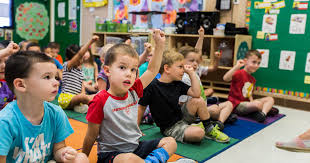How kindergarten can benefit your child
A firm foundation for a child’s academic and social learning is provided by sending him/her to kindergarten. Numerous early childhood education researches back this when their studies see the numerous advantages of letting a child attend kindergarten.
The multiple benefits kindergarten provides to children include:
A learning environment
Kindergarten is often the first structured setting most children experience. The structured environment provided by kindergarten provides a host of opportunities for children as they learn to follow instructions and share with their peers and caregivers. Teaching these skills to very young children lays a firm foundation for later formal schooling.
Learning becomes more fun and enjoyable when kids do it with their peers. The social interaction between peers also develops the social skills of children. This enables them to quickly make new friends while learning to follow and obey instructions from teachers.
A nurturing place for a child’s curiosity
Children are naturally curious. They want to find out how things work. Kindergarten is the perfect environment to use the ideas and interests of children to help them find answers to their never-ending questions. The natural curiosity of children is encouraged and motivated by their teachers to positively accelerate their growth.
Simple and chance events such as the discovery of a worm during an outdoor play activity can become another exciting pathway to learning.

An opportunity to develop cognitive and language skills
The language-rich learning atmosphere provided by kindergarten nurtures and develops the language skills of children. New words are introduced almost every day used by caregivers in the form of provocative questions that encourages children to think and learn to express their answers. Hands-on experiences such as talking about a favourite book, singing, and acting out the stories provide numerous opportunities for children to expand and develop their language and cognitive skills. Children are encouraged to hone their cognitive skills by problem-solving or testing their ideas.
Develop and enhance their reading and math skills
Numbers and reading are the things that many young children show increased interest. The various games and activities implemented by good kindergarten schools provide the best way for children to acquire reading and math skills.
For instance, board games, counting games, matching, and sorting are just a few fun activities for children to understand numbers and sequences. A firm understanding of sequences and numbers sets a good foundation for later math learning.
Problem-solving and planning ahead are the skills provided by activities such as putting puzzles together. These activities have proven to be meaningful and interesting to very young children.
Learn emotional self-control and social skills
Children need to feel safe and secure for them to open up to learning. Spending time away from their parents can make a child anxious and insecure. High-quality kindergarten schools create warm and nurturing environments for children and teachers.
Teachers of good quality kindergarten programs ensure a safe environment to nurture self-control learning to the children. Conflicts between the children are not automatically resolved by teachers. Rather, teachers have the good sense to let the children work out their conflict or the right time to intervene.
Kindergarten offers a nurturing and learning environment for children to develop emotional, intellectual, and social skills. The early education programs implemented by kindergarten schools help children to easily transition to formal schooling. Contact us at Treehouse childcare centre to learn more.

